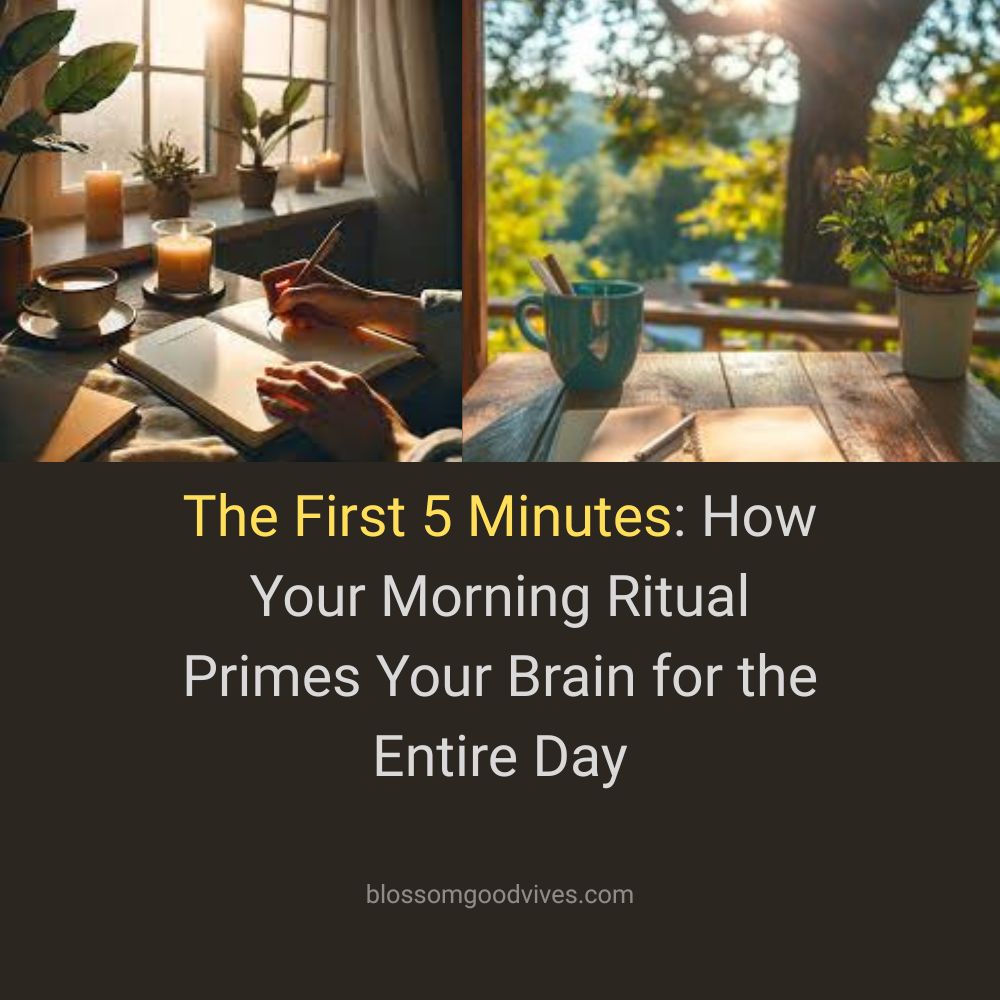
The alarm clock blares. In the hazy twilight between sleep and wakefulness, a window of the day opens. The first five minutes of your day are not just a transition; they are base. What you do in those initial moments—whether you reach for your phone, sit in silence, or make your bed—acts as a set of instructions for your brain, programming your mental and emotional trajectory for the hours to come.
Neuroscience reveals that this isn’t just folk wisdom; it’s a physiological reality. The activities we choose first thing set the tone by directly influencing our neurochemistry, priming our brains for either a state of reactive stress or intentional calm.
The Default Modern Habit:The happiness hormone drained by your phone
For most, the reflexive first action is to check their smartphone. It feels productive—we’re catching up on emails, news, and messages. But neurologically, it’s one of the most disruptive choices we can make.
When you open your phone, you are inviting a variety of information—much of it demanding, negative, or stimulating—into a mind that is still soft-focused and vulnerable. This triggers a cascade of stress hormones.
Cortisol Spike: Reading a stressful work email or a negative news headline first thing jolts your system with cortisol, the primary stress hormone. This sets your nervous system into a “fight-or-flight” mode from the moment you open your eyes.
Dopamine-Driven Reactivity: Each notification, like, or new email provides a micro-hit of dopamine, the neurotransmitter associated with reward and pleasure. This trains your brain to seek external validation and constant stimulation immediately, making you reactive to every ping and distraction throughout the day. Your morning becomes a search for the next information, fracturing your attention before it can even consolidate.
Thats how You begin your day not with purpose, but in response to someone else’s agenda.
The Intentional Alternative: Priming for Calm and Control
Intentional rituals leverage the brain’s natural plasticity to build a foundation of focus and tranquility.
1. Mindfulness or Meditation:
Just five minutes of mindful breathing or meditation can dramatically alter your brain’s state. This practice:
Activates the Prefrontal Cortex: It strengthens the part of your brain responsible for executive function—decision-making, focus, and emotional regulation.
Lowers Amygdala Reactivity: The amygdala is your brain’s threat detector. Regular mindfulness has been shown to reduce its size and sensitivity, meaning you become less reactive to stress over time.
Balances Neurochemistry: It reduces cortisol levels and promotes the production of serotonin and endorphins, creating a sense of well-being.
A study published in the journal Psychiatry Research found that participants who completed an 8-week mindfulness program showed significant increases in gray matter concentration in brain regions involved in learning, memory, and emotion regulation .
2. Making Your Bed: The Power of a Small Win
Admiral William H. McRaven, in his famous University of Texas commencement speech, extolled the virtue of this simple act: “If you make your bed every morning, you will have accomplished the first task of the day. It will give you a small sense of pride, and it will encourage you to do another task, and another, and another.”
This isn’t just a metaphor; it’s neuroeconomics. Completing a simple, manageable task provides a small hit of dopamine associated with achievement. This creates a positive feedback loop, motivating you to tackle subsequent tasks and building momentum. It’s a ritual of order that subconsciously signals to your brain that today will be a day of accomplishment and control.
3. Natural Light and Movement:
Stepping outside for even two minutes or looking out a window provides critical cues to your brain.
Regulates Circadian Rhythm: Morning sunlight, particularly its blue light spectrum, signals your brain to fully suppress the sleep hormone and properly cortisol for healthy wakefulness.
Boosts Mood and Alertness: Physical movement, even stretching, increases blood flow to the brain, releasing endorphins and enhancing cognitive function.
Changing this crucial five-minute early morning just after wake-up requires intention, but not a massive time commitment.
Charge Your Phone Outside the Bedroom: This is the most effective single change you can make. Break the reflex by making it physically difficult to reach.
Define Your Ritual Before You Sleep: Decide the night before what your first action will be. Will it be three deep breaths? Drinking a glass of water? Stretching your arms ? Having a plan make this easy.
Start Small: You don’t need a 30-minute meditation session. Begin with 60 seconds of mindful breathing before you even get out of bed. Or commit to making your bed immediately. Tiny wins build lasting habits.
Combine Habits: “Stack” a new habit with an existing one. For example: After I put my feet on the floor, I will take five deep breaths. After I drink water, I will look out the window for one minute.
The Compound Effect of a Conscious Start
The first five minutes don’t just affect your morning; they have a compound effect. A start characterized by intentionality and calm builds neural pathways that make it easier to handle stress, resist distraction, and make thoughtful decisions at 10 AM, 2 PM, and 6 PM.
Resources & Further Reading:
Rock, D. (2009). Your Brain at Work: Strategies for Overcoming Distraction, Regaining Focus, and Working Smarter All Day Long. Harper Business.
McRaven, W. H. (2014). University of Texas at Austin Commencement Address. https://news.utexas.edu/2014/05/16/admiral-mcraven-urges-graduates-to-find-courage-to-change-the-world/
Walker, M. P. (2017). Why We Sleep: Unlocking the Power of Sleep and Dreams. Scribner.
Clear, J. (2018). Atomic Habits: An Easy & Proven Way to Build Good Habits & Break Bad Ones. Avery.
